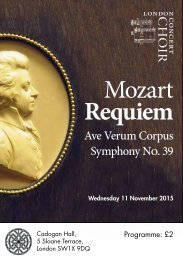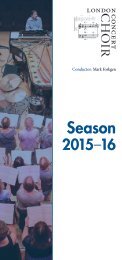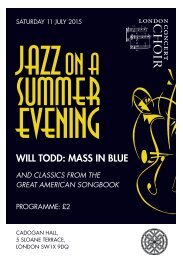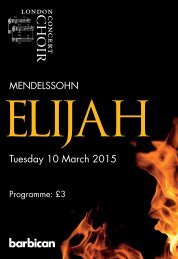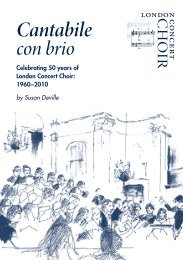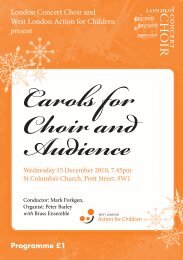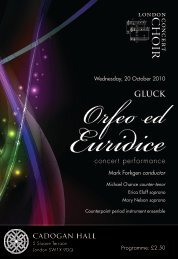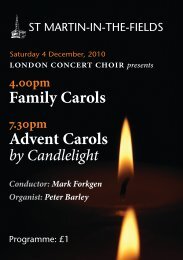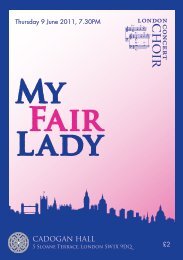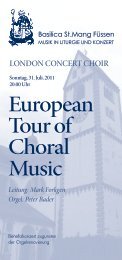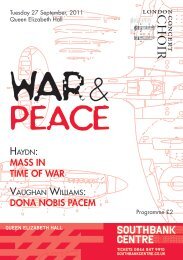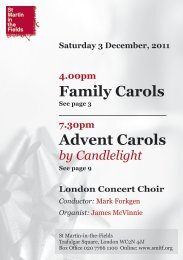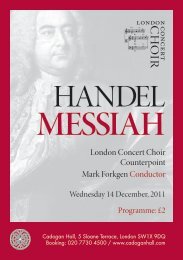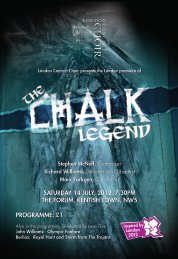22 October 2013: Petite Messe Solennelle (Rossini)
You also want an ePaper? Increase the reach of your titles
YUMPU automatically turns print PDFs into web optimized ePapers that Google loves.
<strong>Rossini</strong>:<br />
<strong>Petite</strong> <strong>Messe</strong><br />
<strong>Solennelle</strong><br />
Victoria:<br />
Missa Salve Regina<br />
London Concert Choir<br />
Mark Forkgen conductor<br />
St Sepulchre’s Church,<br />
Holborn Viaduct, EC1<br />
Programme £2
Please note:<br />
• The consumption of food is not permitted in the church.<br />
• Please ensure that all mobile phones, pagers, and alarms on digital watches<br />
are switched off.<br />
• Flash photography and audio or video recording are not permitted.<br />
• There will be a 20-minute Interval, during which drinks will be served.<br />
Harmonium hired from Harmonium Services<br />
6 Albert Terrace, Saltaire, Shipley, W. Yorks BD18 4PS<br />
With acknowledgements to Simon Scott Plummer for the Programme Notes on the<br />
Missa Salve Regina and John Bawden for the notes on the <strong>Petite</strong> <strong>Messe</strong> <strong>Solennelle</strong><br />
Programme designed by Stephen Rickett and edited by Eleanor Cowie<br />
London Concert Choir<br />
A company limited by guarantee, incorporated in England with registered number<br />
3<strong>22</strong>0578 and registered charity number 1057242<br />
Registered Office<br />
7 Ildersly Grove, Dulwich, London SE21 8EU
Victoria:<br />
Missa Salve Regina<br />
INTERVAL – 20 Minutes<br />
<strong>Rossini</strong>:<br />
<strong>Petite</strong> <strong>Messe</strong> <strong>Solennelle</strong><br />
Mark Forkgen conductor<br />
Jaimee Marshall soprano<br />
Jeanette Ager mezzo soprano<br />
Adrian Ward tenor<br />
Peter Willcock bass<br />
longfordbrown piano duo harmonium & piano
Tomás Luis de Victoria (1548–1611)<br />
Missa Salve Regina<br />
for eight-part choir<br />
See p. 8 for the text and translation of the Mass<br />
The Spanish composer Victoria is regarded as one of the<br />
greatest composers of the Renaissance, together with Palestrina<br />
and Lassus. He was ordained priest in 1575 and later became<br />
chaplain in Madrid to Philip II’s sister, the Dowager Empress<br />
Maria. In accordance with ecclesiastical convention, he wrote only sacred music.<br />
Tonight’s Mass was published in 1592 in Rome, where he had leave of absence to<br />
oversee the publication of this and other works. He remained in Rome, where he had<br />
spent much of his early life, for three years, taking part in Palestrina’s funeral cortège<br />
in 1594.<br />
Victoria wrote 20 Masses, of which four are based on plainchant and the remainder<br />
employ the technique of parody or imitation. Of these, all but four derive from his<br />
own compositions. Several of them, including Salve Regina, are based on his own<br />
Marian antiphons – hymns to the Virgin Mary in which two choirs sing alternately,<br />
one answering the other (the others are Alma Redemptoris and Ave Regina). The<br />
Salve Regina Mass employs the same forces as the antiphon (Choir 1 consisting of<br />
two sopranos, alto and bass, and Choir 2, soprano, alto, tenor and bass) and its<br />
debt to the original antiphon is soon apparent.<br />
The opening section of the Kyrie plays rising against falling figures in each choir<br />
before the two come together over a florid line in Bass 1. In the ‘Christe’, by contrast,<br />
the voices of Choir 2 first ascend, then descend one after the other. The closing section<br />
for both choirs is on a grander scale, Victoria making familiar use of repeated high<br />
notes in Soprano 1 to mark the climax. In the few minutes of this opening movement<br />
his mastery of counterpoint is clear.<br />
In the Gloria, the soprano and tenor entries echo the ‘Salve’ plainchant. Victoria<br />
throws the praises of God in triple time between the two choirs (‘Laudamus te’,<br />
etc.), then combines them, back in duple measure, on ‘Gratias’. Chordal antiphony,<br />
again moving to an eight-part resolution, follows. A gentle passage in canon for<br />
Choir 1 (‘Domine Deus’) leads to exchanges between the two choirs, perfectly suiting<br />
the petititons (‘Qui tollis’, etc.). Soprano 1 rises to repeated high Fs on ‘Tu solus<br />
Altissimus’ and the movement concludes in triple time.<br />
The Credo begins with an inversion of the ‘Salve’ chant in soprano and bass. Victoria<br />
makes abundant use of antiphony in the praises of God. The Incarnation is marked<br />
by broad, falling phrases on the words ‘Et incarnatus est’. There follows the most<br />
remarkable section of the Mass: two soprano and two alto parts weave in intricate<br />
counterpoint and end with a dramatic suspension on ‘finis’. After that, the composer
everts to chordal antiphony, with two excursions into triple time, before both choirs<br />
combine at ‘Et vitam’ in a passage based closely on the final bars of his Salve Regina<br />
antiphon.<br />
The Sanctus opens with long melismas for each choir, in which the first syllable is<br />
spread over a series of notes. Antiphonal effects follow more closely on each other<br />
(‘Dominus Deus’) as the voices move towards ‘gloria tua’. The pattern is repeated in<br />
the ‘Hosanna’. The Benedictus, for Choir 1 only, has the pleasing symmetry of rising<br />
figures followed by falling ones (‘in nomine’), after which the ‘Hosanna’ is repeated.<br />
Victoria set only the first verse of the Agnus Dei, the second, in plainchant, being<br />
supplied by Jon Dixon, editor of the edition being used tonight, and the third repeating<br />
the music of the first. The start of the movement echoes the opening of the Gloria,<br />
there is a beautiful imitative figure for sopranos on ‘miserere’ and the movement<br />
concludes with the composer’s hallmark high Fs from the sopranos of Choir 1.<br />
INTERVAL – 20 MINUTES<br />
Gioachino <strong>Rossini</strong> (1792–1868)<br />
<strong>Petite</strong> <strong>Messe</strong> <strong>Solennelle</strong><br />
for soloists, choir, harmonium and piano<br />
The Composer<br />
<strong>Rossini</strong> is remembered primarily for his immense contribution<br />
to the Italian operatic repertoire, but he also produced two<br />
important pieces of sacred music that are notable, amongst<br />
other things, for their overtly operatic style. This incorporation of the music of the<br />
opera house into the sacred repertoire may appear to have been a bold innovation,<br />
but in terms of dramatic content it was a well-established practice. A prime example<br />
is Handel, but the tradition goes back to Monteverdi, the first great opera composer.<br />
What is original about <strong>Rossini</strong>’s sacred music is not so much its dramatic power,<br />
impressive though that is, as its unashamed romanticism and humour.<br />
Like so many of the great composers, <strong>Rossini</strong> was born into a musical family. His<br />
father was the town trumpeter in Pesaro and his mother was an opera singer. As a<br />
talented boy treble Gioachino was soon in great demand, and by the time he had<br />
reached his teens he could play the viola and the horn and was rapidly acquiring<br />
a reputation as a first-rate harpsichord-player and pianist. He went on to study at<br />
the Bologna Academy of Music, composing his first opera whilst still a student. From<br />
then on his rise to fame was meteoric. He received his first professional commission<br />
in 1810, and this led to a string of further commissions.
With the enormous success of his first full-length opera, Tancredi (1812), and the<br />
even greater triumph of The Italian girl in Algiers (1813), he became celebrated<br />
throughout Italy and his international reputation was firmly launched. He was still<br />
only 23 when he was engaged as Musical Director of the two opera houses in<br />
Naples, for each of which he was required to compose a new opera annually, the<br />
ever-popular Barber of Seville being one of the happiest results. He travelled widely<br />
throughout Europe, and in 1824 settled in Paris as Director of the Théâtre Italien. A<br />
string of new compositions followed, culminating in his acknowledged masterpiece,<br />
William Tell, his thirty-sixth opera, completed in 1829 when he was still only 37.<br />
At this point <strong>Rossini</strong>’s life changed dramatically. For various reasons, including ill<br />
health, he gave up composing, and apart from two important religious works, the<br />
Stabat Mater and the <strong>Petite</strong> <strong>Messe</strong> <strong>Solennelle</strong>, he wrote nothing of significance during<br />
the last forty years of his life. He eventually retired to a luxurious villa specially built<br />
for him at Passy, on the outskirts of Paris, where he would hold court, entertaining<br />
everyone with his sparkling wit and good food, and revelling in the adulation of a<br />
constant stream of admirers and eminent musicians. Despite his withdrawal from the<br />
operatic world, he continued to be held in such enormous esteem that when he died<br />
6,000 mourners, four military bands, a chorus of 400 singers and several of the<br />
finest opera soloists of the day attended his funeral.<br />
In his latter years <strong>Rossini</strong> had turned once again to composition, producing what<br />
he called his Péchés de Vieillesse (Sins of Old Age), a collection of instrumental<br />
and vocal salon pieces, of which the <strong>Petite</strong> <strong>Messe</strong> <strong>Solennelle</strong> is the most substantial.<br />
Composed in 1863 for performance in a private chapel, the Mass was not heard<br />
in public until 1869, the year after the composer’s death, when it was performed in<br />
his own orchestral version at the Théâtre Italien. The work’s title is misleading, since<br />
the <strong>Petite</strong> <strong>Messe</strong> <strong>Solennelle</strong> is not unduly solemn and only ‘little’ in an affectionate<br />
sense. Despite the religious text it is unmistakeably operatic in style, in common with<br />
the Stabat Mater of twenty years earlier. The music ranges from hushed intensity to<br />
boisterous high spirits, and abounds in the memorable tunes and rhythmic vitality for<br />
which <strong>Rossini</strong> became justly famous.<br />
At the end of the autograph score <strong>Rossini</strong> wrote: “Dear God. Here it is, finished,<br />
this poor little Mass. Have I written sacred music [musique sacrée] or damned music<br />
[sacrée musique]? I was born for comic opera, as you well know! Little science, some<br />
heart, that’s all. So may you be blessed, and grant me a place in Paradise!”
The Music<br />
Kyrie - Christe Soloists and chorus<br />
Gloria:<br />
Gloria in excelsis Deo Soloists and chorus<br />
Gratias agimus tibi Terzetto for mezzo soprano, tenor and bass<br />
Domine Deus Tenor solo<br />
Qui tollis peccata mundi Duet for soprano and mezzo soprano<br />
Quoniam tu solus sanctus Bass solo<br />
Cum Sancto Spiritu Chorus<br />
Credo:<br />
Credo in unum Deum Soloists and chorus<br />
Crucifixus Soprano<br />
Et resurrexit Soloists and chorus<br />
Et vitam venturi saeculi Chorus<br />
Preludio religioso Piano and harmonium<br />
Sanctus - Benedictus Soloists and chorus<br />
O salutaris hostia Soprano solo<br />
Agnus Dei Mezzo soprano solo and chorus<br />
The quiet A minor opening of the Kyrie Eleison contrasts sustained choral writing with<br />
a running bass part in the piano accompaniment. This soon gives way to a brighter<br />
mood as the music moves into the major. For the Christe Eleison, <strong>Rossini</strong> adopted a<br />
deliberately archaic style, echoing the church music of Palestrina some 300 years<br />
earlier. As the second Kyrie unfolds, the movement returns to the serious mood in<br />
which it began.<br />
The Gloria begins with a short introduction for chorus and soloists, followed by four<br />
movements for the soloists – Gratias, Domine Deus, Qui tollis and Quoniam – that<br />
are operatic arias in all but name. The chorus returns for the final section of the<br />
Gloria, an extended fugue to the words ‘Cum sancto spiritu in gloria Dei Patris,<br />
Amen.’ This is a real tour de force of musical craftsmanship, reflecting the thorough<br />
classical training in harmony and counterpoint that <strong>Rossini</strong> had received all those<br />
years ago at the Bologna Academy.
In the Credo <strong>Rossini</strong> employs the word ‘credo’, sung by the chorus, as a unifying<br />
motif to which he repeatedly returns. The ‘Crucifixus’ is a plaintive soprano aria, full<br />
of chromatic modulations. This section of the Mass concludes with another brilliant<br />
fugue for the chorus, on the words ‘Et vitam venturi saeculi, Amen.’ There follows a<br />
Prelude for piano and harmonium, leading to a lyrical Sanctus and Benedictus for<br />
unaccompanied soloists and chorus.<br />
Here <strong>Rossini</strong> inserts the soprano solo O Salutaris Hostia, which is not part of the<br />
liturgy but may be used as a hymn during the Mass; it contains the kind of unusual<br />
harmonies which feature in his late pieces for piano.<br />
O Salutaris Hostia<br />
Words by St Thomas Aquinas<br />
O salutaris Hostia,<br />
Quae caeli pandis ostium:<br />
Bella premunt hostilia,<br />
Da robur, fer auxilium.<br />
O saving Victim<br />
Who opens wide the gate of heaven<br />
Our foes press us on every side<br />
Give us strength, bring us thine aid.<br />
The work ends with a moving Agnus Dei for the mezzo soprano soloist and chorus.<br />
Text and translation of the Mass<br />
Kyrie<br />
Kyrie eleison.<br />
Christe eleison.<br />
Kyrie eleison.<br />
Lord, have mercy upon us.<br />
Christ, have mercy upon us.<br />
Lord, have mercy upon us.<br />
Gloria<br />
Gloria in excelsis Deo<br />
Et in terra pax hominibus bonae voluntatis.<br />
Laudamus te; benedicimus te;<br />
adoramus te; glorificamus te.<br />
Gratias agimus tibi<br />
propter magnam gloriam tuam,<br />
Domine Deus, Rex coelestis,<br />
Deus Pater omnipotens.<br />
Domine Fili unigenite Jesu Christe;<br />
Domine Deus, Agnus Dei, Filius Patris;<br />
Glory be to God on high,<br />
and on earth peace to men of good will.<br />
We praise Thee, we bless Thee,<br />
we worship Thee, we glorify Thee,<br />
We give thanks to Thee<br />
for Thy great glory,<br />
O Lord God, heavenly King,<br />
God the Father Almighty.<br />
O Lord, the only-begotten Son, Jesu Christ;<br />
O Lord God, Lamb of God, Son of the Father;
Qui tollis peccata mundi,<br />
miserere nobis;<br />
Qui tollis peccata mundi,<br />
suscipe deprecationem nostram;<br />
Qui sedes ad dexteram Patris,<br />
miserere nobis.<br />
Quoniam tu solus sanctus:<br />
Tu solus Dominus:<br />
Tu solus Altissimus, Jesu Christe,<br />
Cum Sancto Spiritu,<br />
in gloria Dei Patris. Amen.<br />
Credo<br />
Credo in unum Deum,<br />
Patrem omnipotentem,<br />
factorem coeli et terrae,<br />
visibilium omnium et invisibilium.<br />
Et in unum Dominum Jesum Christum,<br />
Filium Dei unigenitum,<br />
et ex Patre natum ante omnia saecula,<br />
Deum de Deo; lumen de lumine,<br />
Deum verum de Deo vero,<br />
genitum non factum;<br />
consubstantialem Patri,<br />
per quem omnia facta sunt.<br />
Qui propter nos homines,<br />
et propter nostram salutem,<br />
descendit de coelis.<br />
Et incarnatus est de Spiritu Sancto,<br />
ex Maria Virgine:<br />
et homo factus est.<br />
Crucifixus etiam pro nobis,<br />
sub Pontio Pilato<br />
passus et sepultus est.<br />
Et resurrexit tertia die<br />
secundum Scripturas,<br />
et ascendit in coelum,<br />
sedet ad dexteram Patris.<br />
Et iterum venturus est cum gloria<br />
judicare vivos et mortuos,<br />
cujus regni non erit finis.<br />
Who takest away the sins of the world,<br />
have mercy upon us.<br />
Who takest away the sins of the world,<br />
receive our prayer.<br />
Who sittest at the right hand of the Father,<br />
have mercy upon us.<br />
For Thou only art holy;<br />
Thou only art the Lord;<br />
Thou only art most high, O Jesu Christ,<br />
With the Holy Spirit,<br />
in the glory of God the Father. Amen.<br />
I believe in one God,<br />
the Father Almighty,<br />
Maker of heaven and earth,<br />
And of all things visible and invisible.<br />
And in one Lord Jesus Christ,<br />
the only-begotten Son of God,<br />
born of the Father before all ages,<br />
God of God, Light of Light,<br />
true God of true God,<br />
begotten, not made,<br />
being of one substance with the Father,<br />
by whom all things were made.<br />
Who for us men,<br />
and for our salvation<br />
came down from heaven.<br />
And was incarnate by the Holy Spirit<br />
of the Virgin Mary,<br />
and was made man.<br />
He was crucified also for us,<br />
under Pontius Pilate<br />
he suffered and was buried.<br />
And the third day he rose again<br />
according to the Scriptures,<br />
and ascended into heaven,<br />
and sitteth at the right hand of the Father.<br />
And he shall come again with glory<br />
to judge the living and the dead:<br />
whose kingdom shall have no end.
Et in Spiritum Sanctum<br />
Dominum et vivificantem,<br />
qui ex Patre Filioque procedit.<br />
Qui cum Patre et Filio simul<br />
adoratur et conglorificatur,<br />
qui locutus est per Prophetas.<br />
Et unam sanctam Catholicam<br />
et Apostolicam Ecclesiam,<br />
confiteor unum baptisma<br />
in remissionem peccatorum,<br />
Et expecto resurrectionem mortuorum<br />
Et vitam venturi saeculi, Amen.<br />
Sanctus<br />
Sanctus, Sanctus, Sanctus,<br />
Dominus Deus Sabaoth.<br />
Pleni sunt coeli et terra gloria tua.<br />
Hosanna in excelsis.<br />
Benedictus<br />
Benedictus qui venit<br />
in nomine Domini.<br />
Hosanna in excelsis.<br />
Agnus Dei<br />
Agnus Dei, qui tollis peccata<br />
mundi, miserere nobis.<br />
Agnus Dei, qui tollis peccata<br />
mundi, miserere nobis.<br />
Agnus Dei, qui tollis peccata<br />
mundi, dona nobis pacem.<br />
And [I believe] in the Holy Spirit,<br />
the Lord and giver of life,<br />
who proceedeth from the Father and the Son.<br />
Who with the Father and the Son together<br />
is worshipped and glorified,<br />
who spoke by the prophets.<br />
And [I believe in] one holy Catholic<br />
and Apostolic Church.<br />
I acknowledge one Baptism<br />
for the remission of sins,<br />
And I look for the Resurrection of the dead.<br />
And the life of the world to come. Amen.<br />
Holy, Holy, Holy,<br />
Lord God of Hosts.<br />
Heaven and earth are full of Thy glory.<br />
Hosanna in the highest.<br />
Blessed is he that cometh<br />
in the name of the Lord.<br />
Hosanna in the highest.<br />
Lamb of God, who takest away the sins<br />
of the world, have mercy upon us,<br />
Lamb of God, who takest away the sins<br />
of the world, have mercy upon us,<br />
Lamb of God, who takest away the sins<br />
of the world, grant us peace.
Mark Forkgen conductor<br />
Mark Forkgen has been Music Director of London Concert<br />
Choir since 1996. He is also Music Director of Canticum<br />
chamber choir, Principal Conductor and Artistic Advisor<br />
of Kokoro (the Bournemouth Symphony Orchestra’s New<br />
Music Group), conductor of the Dorset Youth Orchestra and<br />
Director of Music at Tonbridge School. He has conducted<br />
major UK orchestras, including the Royal Philharmonic Orchestra, Orchestra of<br />
the Age of Enlightenment, Bournemouth Symphony Orchestra, City of London<br />
Sinfonia, English Chamber Orchestra, English Northern Philharmonia and<br />
Manchester Camerata, appearing at major venues, including the Royal Festival<br />
Hall, the Barbican and the Royal Albert Hall.<br />
A specialist in the field of choral and contemporary music, Mark has given the<br />
first performances of more than 100 works. He has also conducted stage works<br />
with the Trestle Theatre Company and Britten Sinfonia, and contemporary opera<br />
with the Unicorn Theatre Company and an ensemble from the Philharmonia, at<br />
the Linbury Studio, Royal Opera House, Covent Garden.<br />
Mark’s wide range of conducting also includes performances with Deep Purple for<br />
the Henley Festival and recreating Pink Floyd’s Atom Heart Mother in the Chelsea<br />
Festival. He has been Conductor and Artistic Advisor for highly acclaimed<br />
festivals including: Sir Peter Maxwell Davies’ 70th Birthday; Stravinsky, ‘A<br />
Festival of Britten’, ‘Music of the Americas’, ‘Britain since Britten’ and ‘East meets<br />
West’. In Europe he has conducted in Denmark (performances of Stravinsky’s<br />
The Rite of Spring), Spain, France, Belgium, Germany, Holland, Eire, the Czech<br />
Republic and Italy (including Handel’s Messiah in Sienna and Israel in Egypt at<br />
the Viterbo Early Music Festival).<br />
Recent seasons have included staged performances of Stravinsky’s The Soldier’s<br />
Tale, a major project for the Cultural Olympiad, recordings for BBC Radio 3 for<br />
‘Music Nation’, a recital at the Royal Opera House and Sondheim’s Sweeney<br />
Todd. Last season included a production of Weill’s Threepenny Opera, a concert<br />
at the Royal Albert Hall involving 1500 performers and performances in Hong<br />
Kong and Bulgaria.
Jaimee Marshall soprano<br />
Jaimee Marshall is a New Zealand soprano who, after<br />
completing a BA in English Language and Linguistics and a<br />
BMus in History and Performance, won several scholarships<br />
to study in London at the Guildhall School of Music and<br />
Drama. She has won various awards in singing, including<br />
the Nelson Aria Competition, Lexus Song Quest and Thelma<br />
King Award, and Duke of Kent Award UK. She has given<br />
recitals worldwide. Highlights include LSO St Luke’s, the Barbican, Mansion<br />
House for the Lord Mayor of London and for the State visit of the President of<br />
China, Hu Jintao.<br />
Jaimee has a special interest in oratorios and has performed as soprano<br />
soloist a wide range of composers from Carissimi to Tippett. Jaimee’s operatic<br />
career encompasses a diverse range of roles, from Anne Trulove/The Rake’s<br />
Progress, Euridice/L’Orfeo, Zerlina/Don Giovanni and Barbarina/Le nozze di<br />
Figaro, through to Frasquita/Carmen, Lauretta/Gianni Schicchi and Contessa<br />
Ceprano/Rigoletto. She has directed and performed two Menotti roles, Lucy/<br />
The Telephone and Monica/The Medium, and was critically acclaimed as Miss<br />
Hedgehog in the European premiere performances of Fantastic Mr. Fox at Opera<br />
Holland Park (2010-12).<br />
More details of Jaimee’s repertoire and upcoming concerts are at<br />
www.jaimeemarshall.com
Jeanette Ager mezzo soprano<br />
Jeanette Ager was awarded an Exhibition to study at the<br />
Royal Academy of Music. She has won the Gold Medal<br />
in the Royal Over-Seas League Music Competition, the<br />
Richard Tauber Prize and an award from the Tillett Trust’s<br />
Young Artist Platform.<br />
As a soloist, Jeanette’s concert and oratorio work has<br />
included recitals and other appearances at the Wigmore<br />
Hall; Handel’s Messiah at St David’s Hall, Cardiff; Elgar’s Dream of Gerontius<br />
at the Queen Elizabeth Hall; Tippett’s Child of our Time at The Royal Festival<br />
Hall; Verdi’s Requiem at Gloucester and Hereford Cathedrals; Beethoven’s Missa<br />
Solemnis at The Barbican Hall and Mozart’s Mass in C minor at the Cadogan<br />
Hall. In addition to performances at many of the leading venues in the United<br />
Kingdom, Jeanette’s concert work has taken her to Bermuda, the Czech Republic,<br />
Spain, Libya and China.<br />
Her operatic roles have included Cherubino in The Marriage of Figaro (Mozart),<br />
Dido in Dido and Aeneas (Purcell), The Marquise of Birkenfield in La Fille<br />
du Regiment (Donizetti), Rosina in The Barber of Seville (<strong>Rossini</strong>), Suzuki in<br />
Madama Butterfly (Puccini) and Thea in The Knot Garden (Tippett). She recently<br />
appeared as one of the Apprentices in Wagner’s Die Meistersinger at the Royal<br />
Opera House, Covent Garden. As a soloist, Jeanette has recorded for Hyperion,<br />
Deutsche Grammophon and Philips.<br />
Jeanette was lucky enough to sing the Angel in the first performance<br />
of Elgar’s Dream of Gerontius in China. She has also performed at the<br />
Three Choirs Festival, singing Britten’s Spring Symphony and John McCabe’s<br />
Songs of the Garden.
Adrian Ward tenor<br />
Adrian trained at the Guildhall School of Music and Drama,<br />
both as an undergraduate and postgraduate on the Opera<br />
Course. A winner of the Royal Over-Seas League Singers<br />
Prize, in 2007 he was selected for representation by Young<br />
Concert Artist Trust. During this time he was an Independent<br />
Opera Fellowship Award winner, a Susan Chilcott Scholar<br />
and a finalist in both the Richard Tauber and Kathleen<br />
Ferrier competitions.<br />
His roles include Orpheus in Offenbach’s Orpheus in the Underworld for<br />
Scottish Opera, Apprentice/Die Meistersinger and Autumn/The Fairy Queen for<br />
Glyndebourne Festival Opera; Don Ottavio/Don Giovanni, Fracto/Prophet and<br />
Loss by Julian Grant; Opera Highlights tour with Scottish Opera; Tamino/Die<br />
Zauberflöte, Horace in Gounod’s La Colombe and The Brazilian in Offenbach’s<br />
La Vie Parisienne at the Guildhall School of Music and Drama; Gonzalve/L’heure<br />
espagnole and Sailor/Dido and Aeneas for the English Bach Festival.<br />
Concert performances include Messiah with the Royal Liverpool Philharmonic<br />
Orchestra, Beethoven’s Ninth Symphony with the Vietnam National Symphony<br />
Orchestra, the BBC Proms in Glyndebourne’s The Fairy Queen; A Child Of Our<br />
Time, Handel’s Solomon, a gala concert with the Aachen Symphony Orchestra in<br />
Brussels, Bach’s B Minor Mass at Snape Maltings, Haydn’s Nelson Mass with the<br />
London Mozart Players at the Cadogan Hall, Elgar’s The Kingdom in Chichester<br />
Cathedral, Stravinsky’s Mass in G and Britten’s Misericordium with the London<br />
Chorus, and Messiah with Sir David Willcocks and the English Festival Orchestra<br />
at the Royal Albert Hall.<br />
As a recitalist he has appeared at the Wigmore Hall, Bridgewater Hall, St John’s<br />
Smith Square and King’s Place. He has sung for the Brighton Festival, Oxford<br />
Lieder Festival, Songmakers’ Almanac, the Schubert Institute (Austria) and the<br />
Steans Institute at the Ravinia Festival in Chicago. Adrian currently studies with<br />
Paul Farrington.
Peter Willcock bass<br />
Peter Willcock trained in visual arts, dance, theatre and music<br />
at Brighton University and studied singing at Trinity College<br />
of Music where he was funded by numerous awards and<br />
scholarships. He has worked with many companies in the<br />
UK, including English National Opera, The Royal Opera,<br />
Opera North, Grange Park Opera, Grimebourne Opera and<br />
Pimlico Opera.<br />
Festivals include Edinburgh, Cheltenham, Dartington, Belle Ile sur Mer,<br />
Huddersfield and Brighton. Peter’s operatic roles include Monterone (Rigoletto),<br />
Leporello (Don Giovanni), Sid and Billy (La Fanciulla del West), Aeneas, Zuniga<br />
and Escamillo, and numerous roles in modern operas/performance pieces. He<br />
is an experienced recitalist and chorus singer and has also worked as a soloist<br />
under the batons of Sir Charles Mackerras, Martyn Brabbins and Diego Masson.<br />
Whilst establishing a career as a mainstream soloist Peter is quite at home in<br />
the world of contemporary music, music theatre, street theatre, early music and<br />
multi-disciplinary performance. He is also actively involved in opera education,<br />
working closely with the education departments of companies such as Opera<br />
North, The Royal Opera House and Grange Park Opera.
longfordbrown piano duo<br />
harmonium & piano<br />
The longfordbrown piano duo was formed in 2002 when<br />
James Longford and Lindy Tennent-Brown met as Junior<br />
Fellows at the Royal College of Music, London. Having<br />
established a reputation for innovative programming<br />
and thrilling performances, the duo takes delight in<br />
compiling programmes (two pianos and piano duet) that<br />
draw upon a wide variety of source material, from the great classical works<br />
through to music of the present day.<br />
James and Lindy are laureates of several major international competitions,<br />
winning Third Prize in the 14th International Schubert Competition in the Czech<br />
Republic, Second Prize and the Rachmaninov Award, 2007 IBLA Grand Prize,<br />
Sicily, and reaching the semi-finals in the Dranoff International Two-Piano<br />
Competition in Miami, Florida.<br />
James and Lindy are experienced chamber musicians who bring a high level of<br />
artistry, energy and commitment to their performances. In 2007, the duo held a<br />
scholarship-supported Creative Development Residency at the prestigious Banff<br />
Centre for the Arts in Canada, where they studied with Jerome Lowenthal and<br />
Lambert Orkis and gave several acclaimed concerts.<br />
Recent appearances include the UK premiere of Stravinsky’s Symphony of Psalms<br />
arranged for two pianos, with The Whitehall Choir under Paul Spicer; <strong>Rossini</strong>’s<br />
<strong>Petite</strong> <strong>Messe</strong> <strong>Solennelle</strong> in Plymouth and London; Poulenc’s Concerto for two<br />
pianos at the Wiltshire Music Centre under Gerry Cornelius, and Orff’s Carmina<br />
Burana in Ramsgate. The duo was honoured to perform at the opening of New<br />
Zealand’s exhibition at the 2011 Venice Biennale.<br />
For more information, visit www.longfordbrown.com
London Concert Choir<br />
London Concert Choir, founded as the Brompton Choral<br />
Society in 1960, now has around 150 members of a<br />
wide range of ages and is notable for its unusually<br />
broad musical repertoire. With Music Director Mark<br />
Forkgen the choir regularly appears at all the major<br />
London concert venues and in cathedrals and churches<br />
in and around the capital, as well as touring to European<br />
destinations. In 2011 a performance of Verdi’s Requiem<br />
with the Augsburg Basilica Choir in the Royal Festival<br />
Hall was followed by a joint concert at the Augsburg<br />
Peace Festival. A tour to Italy is planned for July 2014.<br />
To celebrate its 50th anniversary in 2010 the choir sang<br />
Britten’s War Requiem at the Barbican with Southbank<br />
Sinfonia and in Salisbury Cathedral with Dorset Youth<br />
Orchestra. Since then Southbank Sinfonia have joined<br />
with LCC in Elgar’s Dream of Gerontius at the Royal<br />
Festival Hall, and for an exhilarating concert of French<br />
music at the Barbican. Major works in earlier seasons<br />
include Beethoven’s Missa Solemnis with the English<br />
Chamber Orchestra and Vaughan Williams’ Sea<br />
Symphony with the Royal Philharmonic Orchestra.<br />
On a smaller scale, LCC has sung rarely-heard settings of<br />
the Russian Orthodox liturgy and recently gave a concert<br />
of music from the Queen’s Coronation in celebration of<br />
the Diamond Jubilee. Performances with the Counterpoint<br />
period instrumental ensemble include Handel’s Messiah<br />
and Bach’s St Matthew Passion.<br />
In July 2012 LCC was joined by the Kokoro ensemble,<br />
youth orchestras and choirs from local schools for the<br />
London premiere of Stephen McNeff’s opera-oratorio<br />
The Chalk Legend. Concert performances of operas<br />
and musicals have included Gluck’s Orfeo, Purcell’s<br />
Dido and Aeneas, Gershwin’s Porgy and Bess and<br />
Lerner and Loewe’s My Fair Lady. The choir often gives<br />
concerts for charity and has commissioned a number of<br />
new works.<br />
Mark Forkgen<br />
Music Director<br />
James Longford<br />
Principal<br />
Accompanist<br />
Fabyan Evans<br />
Chairman<br />
Tim Thirlway<br />
Concert Manager<br />
Barbara Whent<br />
Treasurer<br />
Stephen Rickett<br />
Design and<br />
Communications<br />
Jennifer Greenway<br />
Membership<br />
Eleanor Cowie<br />
Publicity<br />
Simon Livesey<br />
Company Secretary
Members of London Concert Choir<br />
Soprano<br />
Susan Baer<br />
Hannah Baker<br />
Gillian Bibby<br />
Dagmar Binsted<br />
Mickey Bowden<br />
Alison Carpenter<br />
Eleanor Cowie<br />
Sally Davis<br />
Gillian Denham<br />
Susan Deville<br />
Nicola Dixon-Brown<br />
Emily Dresner<br />
Serena Ede<br />
Sarah French<br />
Lisa Gardner<br />
Sonya Gray<br />
Jennifer Greenway<br />
Jennifer Hadley<br />
Emma Heath<br />
Ruth Hobbs<br />
Laura Holland<br />
Christine Ingram<br />
Anna Isworth<br />
Jane Joyce<br />
Vickie Kelly<br />
Anna Kosicka<br />
Frances Lake<br />
Tracy LeBrun<br />
Susanna Lutman<br />
Nadine Martin<br />
Elsa Martinez<br />
Jessica Metcalfe<br />
Stephanie Moussadis<br />
Carolyn Newman<br />
Jutta Raftery<br />
Ella Salter<br />
Rachel Scanlon<br />
Ines Schlenker<br />
Frances Shaw<br />
Caroline Sheppard<br />
Amy Thomas<br />
Teresa Tilden<br />
Natalie Tompkins<br />
Emily Tuite<br />
Francesca Walsh<br />
Janet Wells<br />
Julie Wilson<br />
Fiona Wilson<br />
Alto<br />
Helen Beddall-Smith<br />
Frances Cave<br />
Lucy Charman<br />
Carys Cooper<br />
Deborah Curle<br />
Georgie Day<br />
Kathleen Dormer<br />
Rebecca Foulkes<br />
Georgina Furr<br />
Claire Garbett<br />
Anna Garnier<br />
Mary Glanville<br />
Muriel Hall<br />
Penny Hatfield<br />
Andrea Hegedus<br />
Joan Herbert<br />
Caroline Holloway<br />
Chrina Jarvis<br />
Chris Joseph<br />
Sabine Koellmann<br />
Joanna Kramer<br />
Helene Labit<br />
Lorna Lewis<br />
Norma MacMillan<br />
Bridget Maidment<br />
Sophie Marris<br />
Anna Metcalf<br />
Sophy Miles<br />
Judith Paterson<br />
Rachel Pearson<br />
Gillian Perry<br />
Katja Pluto<br />
Dubravka Polic<br />
Katie Prior<br />
Pippa Ranger<br />
Caroline Rawlence<br />
Agnes Ringa<br />
Tabitha Strydom<br />
Kate Tranter<br />
Rachel Vroom<br />
Gabriel West<br />
Barbara Whent<br />
Jane Whittaker<br />
Belinda Whittingham<br />
June Williams<br />
Nathalie Wilson<br />
Tenor<br />
Andrew Bolan<br />
Deborah Bono<br />
Christopher Boustred<br />
David Broad<br />
Roy Carryer<br />
Mark Cheesman<br />
Dave Dosoruth<br />
James Ede<br />
Fabyan Evans<br />
John Galt<br />
Nicholas Hall<br />
Sam Hansford<br />
Richard Holmes<br />
David Ireland<br />
Carolyn Knight<br />
Eli Konvitz<br />
Ian Leslie<br />
Ben Martin<br />
Stephen Rickett<br />
Tim Steer<br />
Tim Thirlway<br />
Bass<br />
Colin Allies<br />
Peter Banks<br />
Ed Brown<br />
Richard Burbury<br />
Henry Cook<br />
Bill Cook<br />
Andrew Cullen<br />
Albert Edwards<br />
James Finlay<br />
Richard Gillard<br />
Nigel Grieve<br />
Nigel Hartnell<br />
Graham Hick<br />
Richard Hughes<br />
Ian Judson<br />
Robert Kealey<br />
Stefan Klaazen<br />
Simon Livesey<br />
Angus Macdonald<br />
Alan Machacek<br />
Ian Mackintosh<br />
Christopher Powell-<br />
Smith<br />
Simon Retallack<br />
Morgan Roberts<br />
Anthony Sharp<br />
Ryszard Stepaniuk<br />
William Tilden<br />
Tony Trowles<br />
Philip Vickers<br />
Dai Whittingham<br />
Thomas Wood
Supporting the Choir<br />
London Concert Choir is committed to high standards and constantly strives to raise<br />
the level of its performances by means of workshops and other special events.<br />
The choir is grateful for the financial contribution of its regular supporters in helping<br />
to achieve these aims, and welcomes their active involvement.<br />
LCC Supporters<br />
Sue Blyth, Deborah and Girome Bono, Simon Cave, Bronwen Cook,<br />
Angela Cooper, Deborah Cullen, Dianne Denham, Geoffrey Deville,<br />
Karen Evans, John and Judith Greenway, Jeremy Groom, Nicholas and Maureen<br />
Halton, Tim Ingram, Miriam Kramer, Mark and Liza Loveday, Jill Marx,<br />
Janet and Michael Orr, Jennifer Powell Smith, Michael Shipley, Anthony Smith,<br />
Sybil and Nicholas Spence, Ruth Steinholtz, Alison Stone, Jill Tilden,<br />
Susan Wheatley, Anthony Willson<br />
For information on helping the choir to maintain its position as one of the leading<br />
amateur choirs in London via the Supporters’ Scheme, please email:<br />
steward@london-concert-choir.org.uk<br />
The choir also offers opportunities for targeted giving and for corporate support<br />
through sponsorship or programme advertising; enquiries should be sent to the<br />
same address.<br />
Life Friends<br />
LCC is delighted to acknowledge the invaluable contribution made by the following<br />
individuals:<br />
Peter Barley, Tim and Patricia Barnes, Anne Clayton, Mr and Mrs Michael Hunt,<br />
Sue McFadyen, Gregory and Helen Rose, Nicholas Spence<br />
Joining the Choir<br />
London Concert Choir welcomes new members, who are invited to attend a few<br />
rehearsals before an informal audition. If you are interested in joining the choir,<br />
please fill in your details online at: www.london-concert-choir.org.uk/joinus<br />
Mailing List<br />
If you would like to receive advance information about our concerts, you can join<br />
the choir’s free mailing list by emailing: mailinglist@london-concert-choir.org.uk<br />
The information you provide is subject to the Data Protection Act and as such will be used exclusively by<br />
London Concert Choir.<br />
www.london-concert-choir.org.uk
FORTHCOMING CONCERTS<br />
Saturday 30 November <strong>2013</strong><br />
St Martin-in-the-Fields, Trafalgar Square, WC2<br />
4.00pm: Family Christmas Carols<br />
7.30pm: Advent Carols by Candlelight<br />
Tuesday 17 December <strong>2013</strong>, 7.30pm<br />
Cadogan Hall, Sloane Terrace, SW1<br />
Bach: Christmas Oratorio - Parts 1 to 3<br />
Monday 17 March 2014, 7.30pm<br />
Queen Elizabeth Hall, Southbank Centre, SE1<br />
Tippet: A Child of Our Time<br />
70 th Anniversary Performance




